
John William Polidori was a British writer and physician. He is known for his associations with the Romantic movement and credited by some as the creator of the vampire genre of fantasy fiction. His most successful work was the short story "The Vampyre" (1819), the first published modern vampire story. Although the story was at first erroneously credited to Lord Byron, both Byron and Polidori affirmed that the author was Polidori.
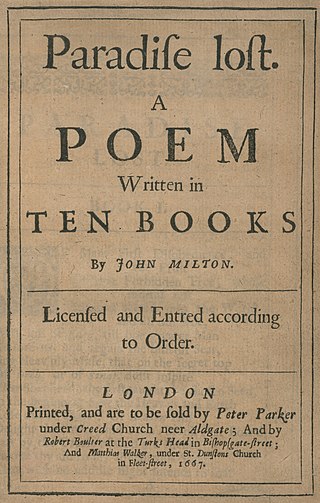
Paradise Lost is an epic poem in blank verse by the English poet John Milton (1608–1674). The first version, published in 1667, consists of ten books with over ten thousand lines of verse. A second edition followed in 1674, arranged into twelve books with minor revisions throughout. It is considered to be Milton's masterpiece, and it helped solidify his reputation as one of the greatest English poets of all time. The poem concerns the biblical story of the fall of man: the temptation of Adam and Eve by the fallen angel Satan and their expulsion from the Garden of Eden.

Gabriel Charles Dante Rossetti, generally known as Dante Gabriel Rossetti, was an English poet, illustrator, painter, translator, and member of the Rossetti family. He founded the Pre-Raphaelite Brotherhood in 1848 with William Holman Hunt and John Everett Millais. Rossetti inspired the next generation of artists and writers, William Morris and Edward Burne-Jones in particular. His work also influenced the European Symbolists and was a major precursor of the Aesthetic movement.
This article contains information about the literary events and publications of 1821.
This article contains information about the literary events and publications of 1795.

Gabriele Pasquale Giuseppe Rossetti was an Italian nobleman, poet, constitutionalist, scholar, and founder of the secret society Carbonari.
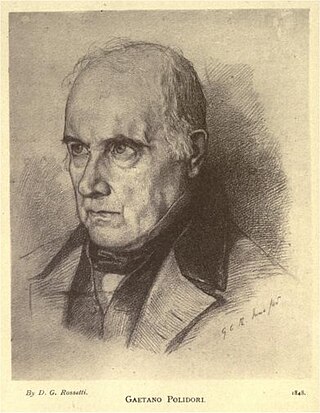
Gaetano Fedele Polidori was an Italian writer and scholar living in Highgate. He was the son of Agostino Ansano Polidori (1714–1778), a physician and poet who lived and practised in his native Bientina, near Pisa, Tuscany.
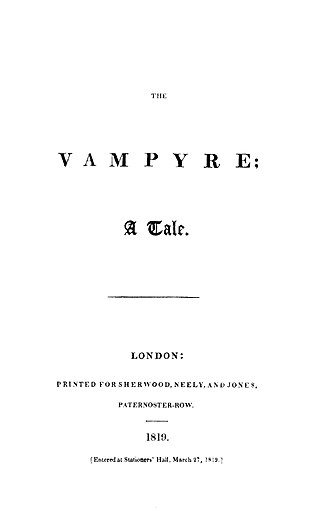
"The Vampyre" is a short work of prose fiction written in 1819 by John William Polidori, taken from the story told by Lord Byron as part of a contest among Polidori, Mary Shelley, Lord Byron, and Percy Shelley. The same contest produced the novel Frankenstein; or, The Modern Prometheus. "The Vampyre" is often viewed as the progenitor of the romantic vampire genre of fantasy fiction. The work is described by Christopher Frayling as "the first story successfully to fuse the disparate elements of vampirism into a coherent literary genre."
Lord Ruthven is a fictional character. First appearing in print in 1819, in John William Polidori's "The Vampyre", he was one of the first vampires in English literature. The name Ruthven was taken from Lady Caroline Lamb's Glenarvon (1816), where it was used as an unflattering parody of Lord Byron, while the character was based on Augustus Darvell from Byron's "Fragment of a Novel" (1819). "The Vampyre" was written privately, and published without Polidori's consent, with revisions to the story made by Polidori for an unpublished second edition showing that he planned to change the name from Ruthven to Strongmore. The initial popularity of "The Vampyre" led to the character appearing in many translations and adaptations, including plays and operas, and Ruthven has continued to appear in modern works. The Lord Ruthven Award (1989–present) by the Lord Ruthven Assembly is named after the character.
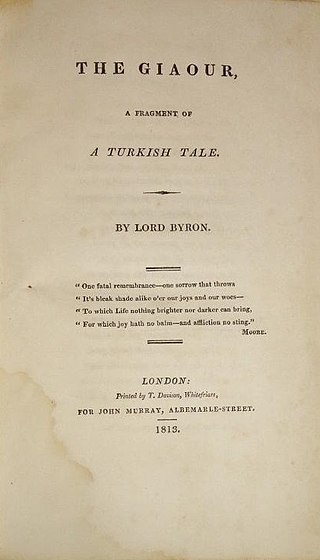
The Giaour is a poem by Lord Byron first published in 1813 by John Murray and printed by Thomas Davison. It was the first in the series of Byron's Oriental romances. The Giaour proved to be a great success when published, consolidating Byron's reputation critically and commercially.
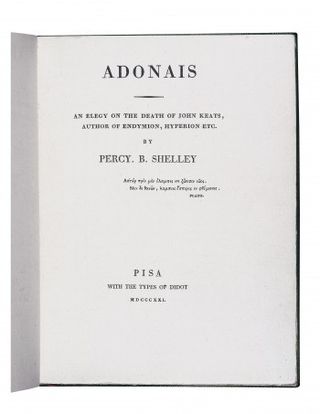
Adonais: An Elegy on the Death of John Keats, Author of Endymion, Hyperion, etc. is a pastoral elegy written by Percy Bysshe Shelley for John Keats in 1821, and widely regarded as one of Shelley's best and best-known works. The poem, which is in 495 lines in 55 Spenserian stanzas, was composed in the spring of 1821 immediately after 11 April, when Shelley heard of Keats's death. It is a pastoral elegy, in the English tradition of John Milton's Lycidas. Shelley had studied and translated classical elegies. The title of the poem is modelled on ancient works, such as Achilleis, an epic poem by the 1st-century AD Roman poet Statius, and refers to the untimely death of the Greek Adonis, a god of fertility. Some critics suggest that Shelley used Virgil's tenth Eclogue, in praise of Cornelius Gallus, as a model.
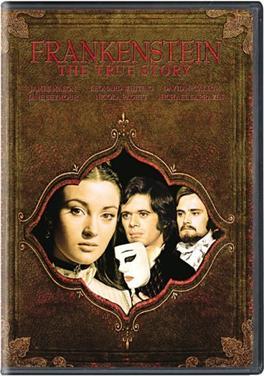
Frankenstein: The True Story is a 1973 British made-for-television film loosely based on the 1818 novel Frankenstein; or, The Modern Prometheus by Mary Shelley. It was directed by Jack Smight, and the screenplay was written by novelist Christopher Isherwood and his longtime partner Don Bachardy.

Cain is a dramatic work by Lord Byron published in 1821. In Cain, Byron dramatizes the story of Cain and Abel from Cain's point of view. Cain is an example of the literary genre known as closet drama.
— words chiselled onto the tombstone of John Keats, at his request
Nationality words link to articles with information on the nation's poetry or literature.

George Gordon Byron, 6th Baron Byron, was a British poet and peer. He is one of the major figures of the Romantic movement, and is regarded as being among the greatest of British poets. Among his best-known works are the lengthy narratives Don Juan and Childe Harold's Pilgrimage; many of his shorter lyrics in Hebrew Melodies also became popular.
Polidori is an Italian surname. Polidori may refer to:

Percy Bysshe Shelley was an English writer who is considered one of the major English Romantic poets. A radical in his poetry as well as in his political and social views, Shelley did not achieve fame during his lifetime, but recognition of his achievements in poetry grew steadily following his death, and he became an important influence on subsequent generations of poets, including Robert Browning, Algernon Charles Swinburne, Thomas Hardy, and W. B. Yeats. American literary critic Harold Bloom describes him as "a superb craftsman, a lyric poet without rival, and surely one of the most advanced sceptical intellects ever to write a poem."

"Fragment of Novel" is an unfinished 1819 vampire horror story written by Lord Byron. The story, also known as "A Fragment" and "The Burial: A Fragment", was one of the first in English to feature a vampire theme. The main character was Augustus Darvell. John William Polidori based his novella The Vampyre (1819), originally attributed in print to Lord Byron, on the Byron fragment. The vampire in the Polidori story, Lord Ruthven, was modelled on Byron himself. The story was the result of the meeting that Byron had in the summer of 1816 with Percy Bysshe Shelley where a "ghost writing" contest was proposed. This contest was also what led to the creation of Frankenstein according to Percy Bysshe Shelley's 1818 Preface to the novel. The story is important in the development and evolution of the vampire story in English literature as one of the first to feature the modern vampire as able to function in society in disguise. The short story first appeared under the title "A Fragment" in the 1819 collection Mazeppa: A Poem, published by John Murray in London.

Romanticism was an artistic, literary, and intellectual movement that originated in Europe toward the end of the 18th century. Scholars regard the publishing of William Wordsworth's and Samuel Coleridge's Lyrical Ballads in 1798 as probably the beginning of the movement in England, and the crowning of Queen Victoria in 1837 as its end. Romanticism arrived in other parts of the English-speaking world later; in the United States, about 1820.













